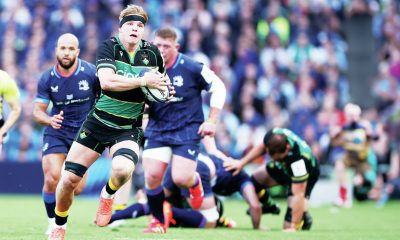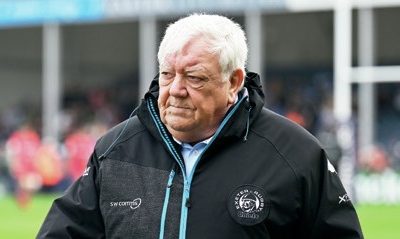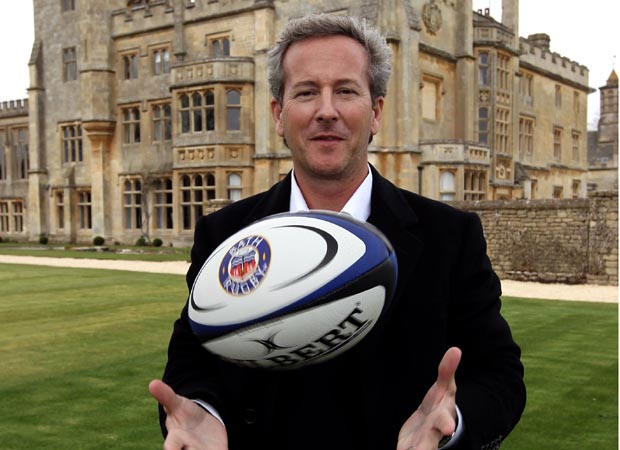 There are a couple of questions that need urgent answers since Stuart Lancaster‘s extraordinary elevation this week from being the England head coach, for just 16 months, to being in control of all England elite rugby. How is he going to do it all? And is he a director, a manager, or a coach?
There are a couple of questions that need urgent answers since Stuart Lancaster‘s extraordinary elevation this week from being the England head coach, for just 16 months, to being in control of all England elite rugby. How is he going to do it all? And is he a director, a manager, or a coach?
The extension of Lancaster’s remit to take in the high performance role that Clive Woodward has been hankering after for the last six years centres more power for the elite playing end of the English game into the hands of one man than ever before.
That is no reason to reject it outright, but it is every reason to scrutinize the implications and point out any inherent dangers – and there are plenty.
Closer analysis of what has been done by the RFU‘s chief executive, Ian Ritchie, following the review of the England’s professional rugby department by Sir Ian McGeechan and Peter Keen, the former performance director at UK Sport, suggests that Lancaster’s work-load in his new role will be monumental.
By the yardstick of all previous RFU recruitment, Lancaster, who was hardly on the radar as a senior rugby figure a year ago, is now doing the three most important jobs in the RFU’s elite echelon.
Namely, England head coach, England manager, and, most significant of all in terms of medium to long term strategy, England performance director.
It is a remarkable promotion for Lancaster. Little more than a decade ago he was a PE teacher who embarked on this upward career trajectory in rugby after becoming the Leeds academy manager for four years, having formerly been an openside flanker at the club. He was then director of rugby at Leeds for two years, before joining the RFU as head of Elite Player Development and combining that with being the Saxons coach for three seasons.
Regardless of Lancaster’s career path, there is a glaring conflict of roles inherent in his appointment as head of the RFU’s grandly named International Performance Department, while at the same time being England head coach. On top of that there is a workload which, on the basis of the RFU’s previous remuneration history for the jobs in question, ought to earn Lancaster well over £1m a year.
Above all, the job of the England head coach is to produce a team that are bristlingly competitive in every Test they play. It is a here and now job, in which you are judged by your coaching peers, the fans, and the media, primarily on your last performance, although those results immediately surrounding it are also influential.
In Lancaster’s case, given that he has been appointed head coach until just after the 2015 World Cup that England host, he is also charged with the short term objective of ensuring that he is three-deep with talented players identified and honed to a sharp point in every position ahead of the tournament.
If England are to win the World Cup for a second time, that is what it will take. It is a huge and complex task given the rate of attrition, either through injury or fluctuations in form, that occurs in professional rugby. At the moment the EPS contingent of the senior squad and the Saxons numbers
 64 players, and every one of them needs specialist coaching, conditioning and monitoring in order to help them peak at the right times over the next two and a half years.
64 players, and every one of them needs specialist coaching, conditioning and monitoring in order to help them peak at the right times over the next two and a half years.
They also need to be part of a coherent tactical strategy between 2013 and 2015 mapped out by the head coach, in which players can slot in as seemlessly as possible. At the same time he must establish a personal rapport with the members of the squad which encourages them to raise their own performance and training standards in every area.
Equally crucial, the England head coach has to ensure that he has an influential relationship with the directors of rugby and coaches at the Premiership clubs. He has to get them to develop potential England players in the positions he wants to see them in, and then to cajole them into giving those same players the game time to develop. This requires not only detailed knowledge of each player through time spent watching them, but it is also challenging, time-consuming, and involves considerable powers of persuasion.
He also has to ensure that the England programmes he puts in place are varied and stimulating enough to enthuse players – one of Woodward’s strong suits – rather than flogging them.
Being head coach of a nation about to host a World Cup is a big enough task for even the most experienced coach to contemplate, and Lancaster is still in the foothills. Factor-in a management role which so far has involved him fitting all the England squad’s burgeoning sponsorship and media demands into the schedule, and there is a concern that Lancaster could be overextended.
If you then add the international performance supremo role the whole edifice seems desperately lop-sided, with only one main stanchion – Lancaster – propping up the whole structure.
Ritchie suggested this week that Lancaster had canvassed for the role. “Stuart believes this is absolutely the right way to go,” he said. “Elements of what we’re talking about, he is doing anyway. He is very comfortable.”
Whether Ritchie should be comfortable with his own decision is another matter. It seems as if an epic one-off victory over New Zealand has swayed Ritchie towards granting Lancaster total control of the England elite game, as opposed to making sure that there are men around him to challenge his perceptions, leading to the creative coaching mix that Woodward not only instigated, but thrived on.
Lancaster remains an inexperienced international coach. The cold facts are that, so far, apart from a landmark win over the All Blacks, he has won nothing in terms of Test rugby’s biggest challenges.
Perhaps there is a hidden agenda where Lancaster moves into the International Performance role and hands over the England head coach reins to Graham Rowntree or Andy Farrell. Whatever the plan, Ritchie has made a huge leap of faith.


British and Irish Lions
Charlie Elliott: The 17 backs I would select for the British and Irish Lions

British and Irish Lions
Charlie Elliott: The 21 forwards I would select for the British and Irish Lions squad
























You must be logged in to post a comment Login